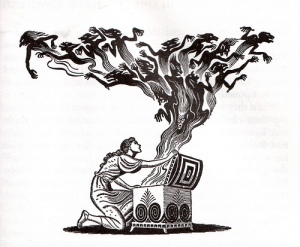Every so often I bump into an anti-feminist or an MRA who tells me that it’s ridiculous for me to be a feminist in America. If I was really a feminist I’d expel all my time, energy, and attention on real problems like the horrible subjugation of women in the Near and Middle East. Jessica Valenti has written a response to this sort of false equivalency, saying “The goal of feminism is justice – not to just be better off than other oppressed women. There’s no such thing as equal by comparison.”
But, I want to talk about this because I have something Jessica Valenti doesn’t: lived experience with Christian Patriarchy.
The above accusation– that if I were really a feminist I’d only care about “third world country oppression”– is driven by the belief that American-focused feminism is petty, shallow, ridiculous, unnecessary, and somehow vengeful, like how this article paints it by limiting American feminism to “banning the word bossy.”
First, I’m not interested in playing the “who has it worse” game. I’ve never engaged in Oppression Olympics, and I’ve never gotten behind the idea that, for example, my partner shouldn’t complain about his headache because I have fibromyalgia and endometriosis. Yes, I think it’s absurd that women in Saudi Arabia can’t drive. Yes, my stomach turns at the rape crisis happening South Africa and the growing frequency of acid attacks in India. Yes, I’m horrified that, last week, a 15-year-old girl was strangled and then incinerated for helping her friend elope.
But, the people who tend to throw this particular accusation in my face aren’t actually upset at my supposed lack of empathy for these women. Their argument is made from ignorance, and they make it because they are privileged and willingly blind. They say we can vote, and we have [some, and eroding] legal rights, so I should just stop being such a harpy and getting my panties in a twist because I don’t like how often women say “sorry.”
***
Almost 1,500 American women are killed by their husband or boyfriend every year. More than half of them will be shot to death. 1 in 5 high school girls report being physically or sexually abused by their male partner, and 1 in 4 women will be sexually assaulted or raped in college (and to be pre-emptive, that’s a link to the Post-Kaiser poll, which was a random sampling of 1,053 of current college students, so you can take your “that 1 in 5 statistic doesn’t count ‘cuz it was only two colleges!” bullshit elsewhere).
But these are all problems we’re familiar with, mostly.
What they don’t know is that all the problems they point to in those foreign places (which are populated by brown people and are usually culturally Islamic, let’s be real about the racism and Islamaphobia happening)— they exist here. In different forms, sure– we don’t use the term “honor killing” when a man murders his wife for adultery– but the consequences of misogyny and patriarchy in America are far-reaching.
I grew up in a culture that explicitly taught me that I, as a woman, shouldn’t vote. In fact, I must not vote if my vote were to contradict my husband’s, they argued. Thankfully my parents countermanded this, but the reality is that I personally knew a few dozen women in college who didn’t vote because they thought that women’s suffrage was wrong. Since I’ve started moving in ex-fundamentalist circles, I’ve found that it wasn’t limited to my neck of the woods, either– Libby Anne once argued as a teenager that “in an ideal world, women shouldn’t vote,” and she’s from the Midwest, not the Deep South. Oh, and this argument still exists today. In fact, Nancy Leigh DeMoss called the women’s suffrage movement sinful in her enormously popular Lies Women Believe.
So while yes, technically women can, legally, vote– a toxic and widespread culture frequently forbids it. Even if something is legal, what good is it if women can’t access it?
I was taught in the Stay-at-Home-Daughters movement that women shouldn’t be educated, and were forbidden from leaving home to seek employment. I was taught that women can’t be trusted to supervise, manage, or govern anything– we barely even run our own households, and we certainly shouldn’t be given control over our finances. We didn’t have to wear burkas or hijab (although the definition I was taught for “modesty” was based on a Hebrew word that means “long and flowing” and a lot of us wore head coverings), but we were prevented from basically ever leaving our houses or existing in the public sphere.
And even though marital rape was made illegal everywhere in the US in 1993, there are still eight states that have “marital exemptions” for rape– and that’s not even touching all the Christian people who think “marital rape is an oxymoron,” including people like Nancy Wilson, who’s the wife of one of the biggest names in conservative evangelicalism. She’s written regarding marital sex that “But of course a husband is never trespassing in his garden.” Your basic, run-of-the-mill, everyday conservative Christian is as rabidly misogynist as Vox Day.
It looks different than what people think happens in the Arab world, but it’s a similar ideology with similar practical consequences.
These positions are championed by the homeschooling world’s biggest names, presented at basically every convention, and the related (although not identical) Quiverful movement has had multiple reality television shows about it, most famously 19 Kids and Counting. That supposedly nice, happy, perky, oh-so-chipper family share the same fundamental beliefs about women as those who shot Malala Yousafzai in the head. Christian fundamentalism can no longer be discounted as “fringe” when Ted Cruz is almost as fundamentalist as they come, and he earned 45% of the Republican delegates– with plenty of evangelicals feeling that he closely aligned with their values and beliefs.
Oh, and just in case you thought that the oppression of women and children was limited to keeping us chained to our homes and dismissing marital rape as impossible, it’s not. A few weeks ago I saw a bunch of articles on child marriages go through my feed, with many people shocked and horrified (which they absolutely should be). When I told a woman who’d exclaimed “I’m so glad that doesn’t happen here!” that child brides do indeed exist right here at home, she didn’t believe me. It’s not her fault. Most people are unaware of the long and continuing history of child marriage in America.
Growing up, one of the most romantic, lovely, well-circulated and highly praised stories of courtship I’d ever heard was told about Matthew and Maranatha Chapman:
When Matthew first expressed his interest in Maranatha … Maranatha was 13 and Matthew was 26. When Matthew heard from God that he was to marry Maranatha, and begged Stan [her father] to let him propose marriage to her, Maranatha was 14 and Matthew was 27. When Stan gave Matthew the go ahead to propose to his daughter, Maranatha was 15 and Matthew was 27. They were the same ages when they married just over a month later.
A 26-year-old man was sexually interested in a 13-year-old little girl, and this story gets passed around as the ideal courtship. In fact, when Matthew confesses his attraction to Maranatha’s father, Stan’s response to is say that his feelings for a 13-year-old are from God, I shit you not.
But that story is from the 80s! It’s over two decades old! Well, this one isn’t. It’s from this week. A misogynist decided to organize an event where patriarchs can go and sell their daughters for a “bride price,” and the man running it said this on the event’s website:
The woman who has arrived physically and sexually at a point where she is ‘ready’ for a husband, is ready for a husband, else we make God out to be a liar… Calvin and Gill, quoting the Jewish authorities in reference to the term Paul uses in I Cor 7:36, place the lower limit of this at twelve years old for girls …
Scripture speaks of the father of the son “taking a wife” for his son, and the father of the bride “giving” her to her husband It gives example after example of young women being given to young men, without the young woman even being consulted …
And while this stinking pile of shit thinks “not very many girls” are truly ready for marriage at 12 years old, they could be and he says there’s nothing wrong with marrying her off for a bride price without her consent.
Burn it down. Burn everything down.
Our belief in American exceptionalism prevents nearly all of us from seeing these things as they really are, as they really happen. We hear about some “Get Them Married Retreat” and think “oh, that’s Kansas, that’s Christian fundamentalists, that’s hilarious.” As if the thousands upon thousands– if not millions– of children being raised in conservative and fundamentalist households don’t matter, or aren’t significant enough to care about. It’s easy to think of brown, Islamic people being horrible to women and children because that fits in with our imperialist and white supremacist view of the world. It’s easy to dismiss anything white, Christian people do because we can justify them as “outliers” … and because they look like us, it can’t be that bad.
Except it is. It’s worse than you think.










